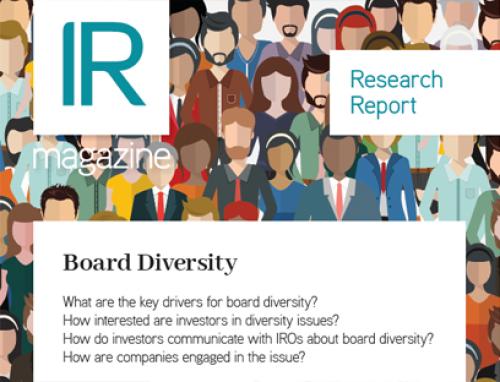I love our industry, but when aspiring IR professionals of color seek my advice, it can be hard to put that love in credible terms. Often, they ask not just about the industry, but about how its dynamics work – or don’t – for people like us.
The question is fraught with frustration for me. For 20 years, I’ve heard talk of diversity as a corporate value, but little has changed: I have spent most of my career as the only person of color in the room.
Just looking at the websites of the five largest firms in our business, less than 5 percent of their staff are people of color. NIRI – in line with the majority of public companies in the US – does not report a racial breakdown of its membership. Recently, investors have started to bemoan the lack of data about racial equality in corporate America. After all, how can you address an issue and create change if you don’t collect the data and publicly acknowledge the issue? I would argue that the IR profession needs to look inwards, as well as outwards, on the issue of race.
IR needs allies and anti-racists
I don’t accuse our profession of racism, but this lack of representation points to inherent bias. In my experience, our community has an issue with both attracting and retaining people of color. I’ve personally felt I’ve had to work against the inherent bias that exists since I first started working in IR back in 1997. Early in my career I had a three-year stint at an agency that employed more than 300 people. During those three years, I was the only person of color working at the account supervision level or higher.
Throughout my career, micro-aggressions have been prevalent. As a person of color, I’ve been asked to tone down my passion, been confused with being a service worker at client meetings and been told that I don’t act, dress or speak like a Hispanic. None of these statements were ever made with bad intent but they all signaled the fact that I was very different and that I was looking in from the outside.
My search for mentors yielded few takers and, therefore, much of my IR knowledge came by trial and error – situations that I know a mentor could have helped me navigate. Even after establishing myself at the assistant vice president level, I got no response to resumés submitted to more than 150 openings at publicly traded companies across the tri-state area. After the crash, positions were reduced across the profession and opportunities were even harder to come by.
I have persisted, opened my own consultancy and stayed in IR, unlike many colleagues of color, and have continued to fight to be recognized as relevant to IR. I have done this in part out of a sense of obligation because there are so few like me who can be a mentor to young professionals aspiring to a career in this field.
Race and the need for change are on everyone’s minds following the George Floyd murder. Corporations and CEOs are issuing public statements and donations in support of organizations that work to end racism. That their stance is overdue does not make it less welcome, and a rise in the creation of diversity initiatives could signal a further step toward the business world’s embrace of its share of responsibility for ending institutional racism and bias.
But I need to see more than statements and gestures. I need – and IR needs – a sustained commitment to a genuine change in hiring practices that we can see in the make-up of account teams, corporate leadership, management and board members throughout this field. Making that change will require genuine leadership and courage.
If you work in IR, you must be aware that ESG practices are associated with improved public company performance. Diversity is one of the values enshrined in ESG practices. How can we, as a profession, address this topic in our investor communications without addressing it in our own ranks? How can advisers assist their clients with their ESG and diversity messaging without addressing the need for change internally? How can corporate IR professionals help to identify, nurture and develop investor relations professionals of color? How can we build a culture in our profession that attracts and retains people of color because of our inclusivity, not in spite of our lack of representation?
It’s time for a diversity action plan
So what do we do?
- Let’s start by making an honest effort to free hiring practices of bias. This video is a good place to start in building an understanding of implicit bias.
- Partner with organizations like the Posse Foundation – which draws people of color from the talent pool – to actively pursue diversity hiring in your workplace.
- Seek the input of people of color who are veterans of the industry to help create programs that will enable mentorship for the new generation of IR practitioners.
- Become an active recruiter for the industry. If you meet a person of color in an adjacent field like accounting, finance, financial journalism or corporate communications, try to poach him or her for our team.
- Be an ally, both in words and deeds, to the people of color already at your firm so they can flourish as homegrown assets.
I don’t want to frighten young professionals of color away from our field, and I’m sure you don’t, either. But our community has work to do before I – or many of my peers of color in investor relations – can answer the question about the dynamics of our profession honestly and positively.
So I challenge my majority colleagues in investor relations to offer the next generation of IR professionals of color a more welcoming work environment and a more promising career track than I encountered. Meeting that goal begins with actively choosing to pursue it and to recognize diversity as the performance metric it always should have been. If we fail at that now, all our other measures of success will be meaningless.
Elric Martinez is the founder of EJM Investor Relations










